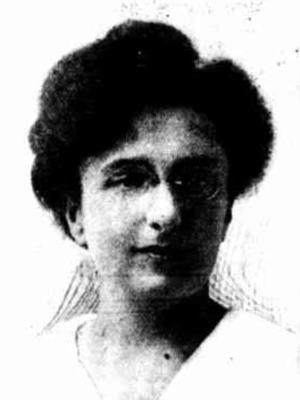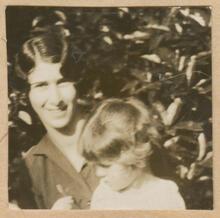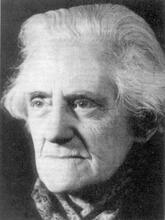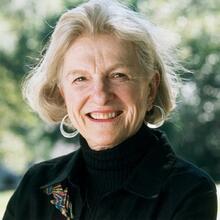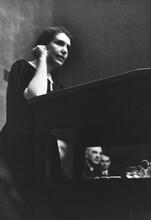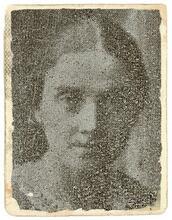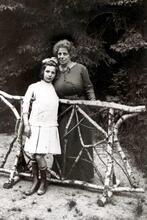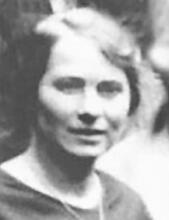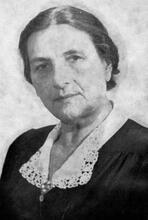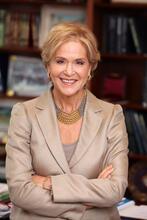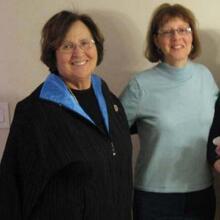Zoe Benjamin
Australian nursery school educator, trainer of kindergarden teachers, and proponent of sex education Zoe Benjamin, September 9, 1925. Via Wikimedia Commons.
Based in Sydney, Zoe Benjamin was a progressively minded Australian nursery school educator and trainer of kindergarten teachers. Diminutive in build (her personal household furniture was scaled-down in size), she was born to socially and communally well-connected Jewish parents but gradually drifted from Judaism herself. Dynamic and dedicated, she rose to national, and even international, fame as a lecturer, writer, and broadcaster on early childhood education and child psychology and as a forthright advocate of sex education.
Early Life and Education
The daughter of Philip Benjamin (1848-1924) and Minnie (Miriam) née Cohen (1851-1918), both of solidly middle-class Anglo-Jewish background, Sophia (Zoe) Benjamin was born in Adelaide, South Australia, on December 24, 1882. (Named Sophia after her maternal grandmother, she was known unofficially almost exclusively as Zoe.) Philip, a senior employee of Jewish-owned tobacco firm Kronheimer and Co., was prominent in intellectual circles and an occasional journalist of some standing; Minnie was a sister of eminent New South Wales parliamentarian and judge Henry Emanuel Cohen and connected by marriage to many prominent Jewish communal figures. Around 1888 the couple moved from Adelaide to Sydney with Zoe and Alva, the elder of Zoe’s two younger brothers, a future British-based physician who married Thelma Hilda Cohen (1890-1979), women’s page “editress” of the London-based nationally circulating Daily Mail. Another brother, Cyril, born in Sydney, completed the sibling set.
Benjamin was educated at home by governesses and private tutors, except for three years during adolescence when she attended a state school in the Sydney suburb of Darlinghurst. Her cousin, Gladys Hope Marks (1883-1970), alongside whom some of her private education occurred, ultimately studied French and German at universityand became a distinguished Sydney academic. Benjamin, whose own studious nature seems to have been satisfied by her father’s encouragement and her access to his well-stocked home library, obtained, in 1905, a diploma from the Sydney Teachers’ Training College in Darlinghurst run by the Kindergarten Union of New South Wales, a body established in the mid-1890s.
The college's inaugural principal (1902-1905) was American Frances E. Newton (c. 1860-1916), who had trained in Chicago under the Froebelian John Dewey. At Newton’s urging, another promising young Sydney Jewish graduate, Lillian Daphne de Lissa (1885-1967), moved in 1905 to Adelaide, where she helped to found the Kindergarten Union of South Australia; beginning in 1917, de Lissa, having imbibed Maria Montessori’s method, resided in England, where she founded and headed the famous Gipsy Hill Training College for Teachers of Young Children.
Early Kindergarten Work
Remaining in Sydney, the equally promising Zoe Benjamin was in 1906 appointed director of the Froebel Kindergarten attached to her alma mater. She admired much of the Montessori system but disliked its neglect of imagination-stimulating free play periods for tots. At the pioneering Free Kindergarten established in the economically deprived neighborhood of Wooloomooloo, in which she had work experience, as at others in the Free Kindergarten movement that were subsequently opened in Australia, the emphasis was on learning through constructive play and fostering cooperative social interaction between peers. The presence of plants and small creatures showed the children the wonders and workings of nature and at mealtimes food was shared out communally, irrespective of who had brought food with them and who had not. The day's assorted activities were timed with small children's short attention spans in mind, with a period of free play introduced at Benjamin’s suggestion, in line with Froebelian ideas. She lamented, however, that the ideals expounded at the Free Kindergartens were all too often deliberately undermined at home by parents, who saw those venues merely as convenient babysitting centers.
In 1908, Benjamin became lecturer in kindergarten education at Sydney's Norland Institute, which trained nurses. In 1910 she founded the highly regarded Australian Kindergarten Magazine, editing it until 1916. During that year she came to public attention with a paper on “The Preventive Training of Young Children in Relation to Sexual Control,” which she delivered to a conference consisting of members of the Workers' Educational Association and the Parents and Citizens' Association; in this paper, she argued that children should be taught the basics of human reproduction as soon as they grew curious, to prevent their obtaining false, salacious, and potentially harmfull mind-dwelling information from other sources. Her “clear, outspoken teachings” on this subject won overt praise in 1926 from the older pioneering Australian sex educator Marion Louisa Piddington, when deploring the advent of a prevailing widespread apathy towards the cause (The Land [Sydney], November 15, 1926, p. 2).
Career Zenith and Impact
In 1922, Benjamin joined the permanent staff of her alma mater, where she had lectured for some years in child study. She “possesses a personality and a driving force that bear...no relation to the cubits of her stature, and one can imagine her...restraining any tendency to wandering attention” on the part of her students “by one glance from her bright brown eye,” wrote a perceptive journalist (The Register [Adelaide], February 5, 1924).
Benjamin spent much of 1923 in Britain, acquainting herself with developments pertinent to young children's education and welfare. Inspired by England's Women's Institutes, on her return to Australia she founded the Free Kindergarten Mothers' Union under her presidency, so that working-class mothers might become proficient in cookery and handicrafts. In 1930, on her initiative, the Kindergarten Holiday Home in Thirroul on the New South Wales coast was established in order to provide beachside vacations for underprivileged inner-city children. When Frances Newton retired as principal of the Sydney Teachers’ Training College in 1932, Benjamin temporarily assumed the role. As another of Newton's most talented alumni noted, Benjamin’s lectures were enhanced by “her love of beauty in music, art and literature and her keen appreciation of all that is fine and noble in many fields of philosophy” (quoted in Cohen, “Not Merely Housewives,” pp. 17-18.) In 1934, when a new principal was appointed, Zoe became vice-principal. She often cooked tasty dishes for the college students, occasionally delighted them with hand-sewn gifts, and gave unshackled personal advice to those who sought her counsel. Accordingly, she forged lifelong friendships with many of the 300 to 400 students she taught at the college over the years. She never married, nor does she appear to have had a romantic partner, but her social life was rich and satisfying.
During the 1930s, Benjamin held tutorials at the University of Sydney on aspects of child psychology. In 1937, she resigned from the training college in order to devote herself wholeheartedly to that field and to “parent education, generally, as I consider that the home is the starting point of all education. So many of the difficulties which parents have with their children cannot be overcome until parents understand the psychology of their own children” (Sydney Morning Herald, November 11, 1937). She continued her emphasis on sex education for youngsters, in order to forestall unhealthy fixations and hang-ups about human sexuality from developing during and beyond adolescence. She also derided attempts to instill in small children the doctrinal underpinnings of religion, holding that it was beyond their comprehension.
In 1938, Benjamin’s series of three articles for the Sydney Morning Herald on difficult children proved so impactful that she gave three more on the theme of difficult parents. During the 1930s and 1940s, she gave a series of innovative radio lectures for the Australian Broadcasting Commission (ABC) on various aspects of child psychology and child rearing. These lectures comprised such topics as the causes and cure of behavioral problems, typical questions children ask, the benefits of constructive and cooperative play, the challenges facing adoptive children and parents, and the resentment and anxiety kindled in returned servicemen's families by fathers seeming to show more affection to their post-war offspring than to their older children. She strongly advocated fathers' involvement in their children's upbringing. So popular did the broadcasts prove that in 1947 they were published in London in book form by the National Association of Maternity and Welfare Centres as Talks to Parents. Other monographs and appearances included her highly praised Education for Parenthood (Melbourne, 1944), You and Your Children (Sydney, 1944), The Schoolchild and his Parents (Sydney, 1950), and her participation opposite two male discussants on the ABC radio broadcast “Do Men Hate Women?” (excerpted in The ABC Weekly, May 31, 1941), in which she championed women's right to follow a vocation beyond “domestic duties” and condemned parental advancement of sons at the expense of daughters.
After World War II, Benjamin served as chief lecturer for the educationally progressive New Education Fellowship in New South Wales. Severely visually impaired in old age, she died of cardio-vascular disease on April 13, 1962. Seemingly deracinated from Judaism—details are elusive—she was cremated following an Anglican funeral service. A Memorial Fund established in her name benefited the Public Library (now State Library) of New South Wales.
ABC Weekly, May 31, 1941
Advertiser (Adelaide), July 29, 1944.
Age (Melbourne), June 8, 1954.
Australia Star, November 17, 1902.
Australian Women's Weekly, October 7, 1933; April 7, 1934; November 25, 1953; December 16, 1953.
Cohen, Lysbeth. “Not Merely Housewives.” Australian Jewish Historical Society Journal, vol. ix, part 1 (1981), pp. 8-24.
Cohen, Lysbeth, “Beginning with Esther: Some distinguished Jewish women of New South Wales.” In Lives Obscurely Great: Historical Essays on Women of New South Wales, edited by Patricia Thompson and Susan Yorke. Sydney: Society of Women Writers (Australia), NSW Branch, 1980, pp. 156-165
Hebrew Standard(Sydney),August 7, 1908; October 27, 1911, December 1, 1916.
Hinsby, Margaret. “Benjamin, Sophia (Zoe) (1882–1962).” Australian Dictionary of Biography, National Centre of Biography, Australian National University, Canberra, 1979; online at http://adb.anu.edu.au/biography/benjamin-sophia-zoe-5205/text8759.
Jewish Herald (Melbourne), December 28, 1906; September 30, 1910.
Jones, Helen. “de Lissa, Lillian Daphne (1885–1967).” Australian Dictionary of Biography, National Centre of Biography, Australian National University, Canberra 1979, online at https://adb.anu.edu.au/biography/de-lissa-lillian-daphne-5946/text10139.
The Land (Sydney), November 15, 1929.
Methodist (Sydney), June 14, 1919.
Queanbeyan Age, December 29, 1911.
The Register (Adelaide), February 5, 1924.
South Coast Times(NSW), August 31, 1953.
Sunday Times(Sydney), June 30, 1929.
Sydney Stock and Station Journal, August 21, 1914.
Newcastle Morning Herald (NSW), June 23, 1943.
Sydney Morning Herald, September 11, 1912; November 11, 1937; July 19. 1938; August 9, 1938; July 3, 1953; April 7 and April 22, 1954.
Truth (London), July 18, 1947.
Wireless Weekly (Sydney), March 22, 1935.

